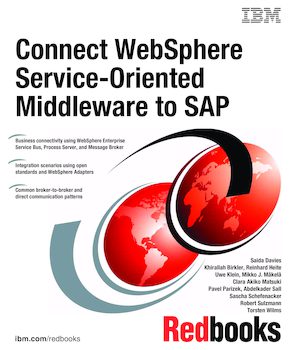Connect WebSphere Service-Oriented Middleware to SAP
An IBM Redbooks publication
Note: This is publication is now archived. For reference only.

Published on 01 June 2007, updated 13 June 2007
ISBN-10: 0738486205
ISBN-13: 9780738486208
IBM Form #: SG24-7220-00
Authors: Saida Davies, Khirallah Birkler, Reinhard Heite, Uwe Klein, Mikko J. Makela, Clara Akiko Matsuki, Pavel Parizek, Abdelkader Sall, Sascha Schefenacker, Robert Sulzmann and Torsten Wilms
Over years, the typical IT infrastructure grows and is very likely a collection of separated, heterogeneous environments that can collide with today's requirement for companies to react quickly to changing business needs. This changing environment demands a middleware that is both robust and extensible as well as flexible when reacting to change.
With WebSphere Middleware products from IBM you can operate flexible service-oriented architectures that overcome these integration challenges. The IBM WebSphere Service-Oriented Middleware product suite includes different integration brokers and a multitude of application and technology adapters. In addition to the adapter-based integration approach, this product suite supports a wide range of open standards to connect any back-end component in a service-like manner to the middleware infrastructure.
This book highlights broker-to-broker connectivity to the SAP Exchange Infrastructure as well as direct communication patterns to the SAP WebApplication Server. This book also illustrates how to integrate data and processes that are located in SAP back-end systems that use IBM Service-Oriented Middleware technology. The adapter-based scenarios use the WebSphere adapters for SAP, and the standards-based integration scenarios use the Web Services and Java Message Service capabilities that are built in to the products of both IBM and SAP.
Part 1. Overview
Chapter 1. Introduction and objective of the book
Chapter 2. Key technologies and concepts
Chapter 3. Product overview
Part 2. Scenarios
Chapter 4. Scenarios overview
Chapter 5. Configuring SAP XI for the SOAP and JMS-based scenarios
Chapter 6. Web Services based integration to SAP Exchange Infrastructure scenarios
Chapter 7. JMS-based integration scenarios between WebSphere Enterprise Service Bus and SAP Exchange Infrastructure
Chapter 8. JMS-based integration scenarios between WebSphere Message Broker and SAP Exchange Infrastructure
Chapter 9. Web Services based integration to SAP WebApplication Server scenario
Chapter 10. XML based exchange of IDocs between WebSphere Application Server and SAP WebAS
Chapter 11. Adapter-based integration to SAP: JCA Adapter BAPI scenarios
Chapter 12. Adapter-based integration to SAP: WebSphere Adapter for SAP Software ALE Scenarios
Chapter 13. Adapter-based integration to SAP: WebSphere Business Integration Adapter scenarios
Appendix A. Additional material